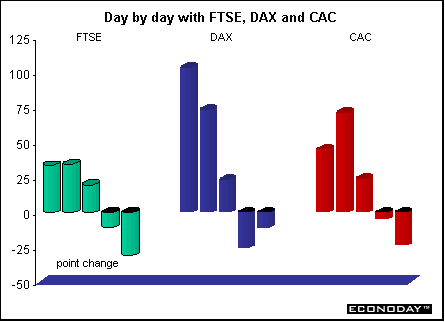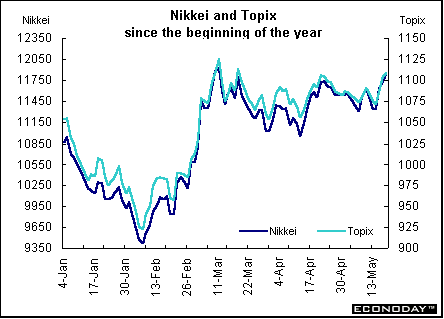Recap of global marketsEurope and BritainBritish and European markets recovered smartly last week from the previous week’s declines, thanks to gains in technology stocks. And even though they lost ground at week’s end, the FTSE 100 rose 0.9 percent while the Paris CAC rebounded by 2.6 percent and the Frankfurt DAX jumped by 3.4 percent on the week.  The Bank of England’s May Inflation Report gave a clear signal that the Bank is poised to raise interest rates soon. The report forecast a swift return to above trend growth and said that inflation was likely to come in above target at the end of the two-year forecast horizon. The Bank has a 2.5 percent inflation target and has managed to keep prices at or below that level for the last couple of years. The Bank’s inflation fighting success differs markedly with the European Central Bank’s record over the same time period. The ECB has tried and failed to keep inflation below its 2.0 percent ceiling. Weaker growth, combined with structural rigidities, has made the ECB’s task more daunting. AsiaAsian markets with the exception of the Singapore Straits index rose on the week. South Korea, which jumped 7 percent, once again outperformed all the indexes followed here with the exception of the Nasdaq, which was 8.8 percent higher on the week. Japanese capital flows in the week ending May 10 showed that Japanese investors were again modest net buyers of foreign equities but sellers of bonds, while foreign investors were again net buyers of both Japanese equities and bonds despite credit ratings worries.  Speculation around an expected Moody's credit downgrade continued to swirl as government officials angrily attacked the ratings agencies, including Fitch and S&P. A Moody's one-notch downgrade to A1 would put Japan on par with Hungary, while a two-notch downgrade to A2 would push Japan below Botswana's rating and put it on par with Latvia and Cyprus. Vice Finance Minister for International Affairs Haruhiko Koruda argued that Japan's special role as an international creditor and its large current account surplus justifies a higher grade. A downgrade would not only be embarrassing for Japan, it would also have secondary effects on the already fragile banking sector. At present, standards set by the Bank for International Settlements state that a 20 percent risk weighting must be applied to all single "A" rated assets. A downgrade would thereby erode the banking sector's tier-1 capital in Japanese government bonds, and with Japanese banks already saddled by a massive burden of bad debt, fears are growing that many banks would not have the capital necessary to meet the BIS requirements. | ![[Back To Archive]](../../../images/backtoarchive.gif)